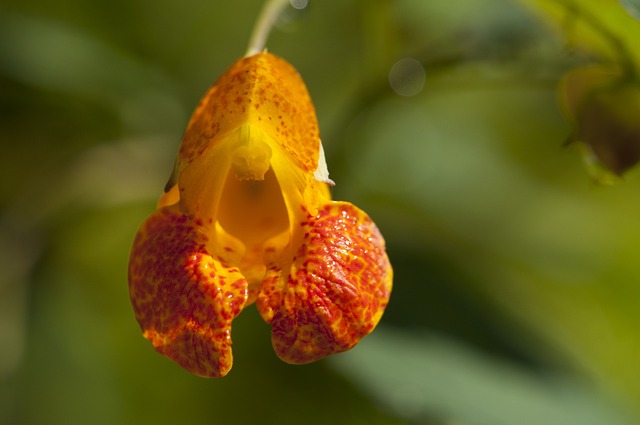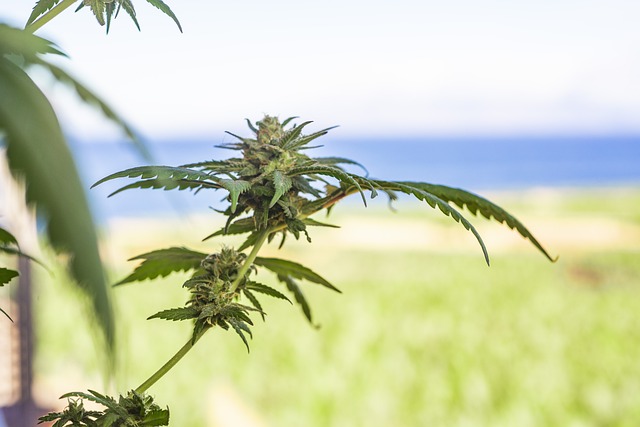
The THCA flower, a non-psychoactive cannabinoid-rich substance, is gaining recognition for its potent anti-inflammatory properties. Studies suggest that THCA interacts with the endocannabinoid system to inhibit pro-inflammatory cytokines and enzymes, offering a natural alternative to conventional anti-inflammatory drugs. Its therapeutic potential is highlighted by its ability to modulate immune responses, which could be beneficial for treating chronic inflammatory diseases like arthritis and inflammatory bowel disease. The synergy between THCA and other cannabis compounds such as terpenes, like myrcene and beta-caryophyllene, further amplifies its anti-inflammatory effects. Ongoing research continues to elucidate the mechanisms behind these benefits, reinforcing the THCA flower's role in managing inflammation without psychoactive side effects. As interest in holistic health approaches grows, the THCA flower stands out as a promising anti-inflammatory agent with broad applications in treating inflammatory conditions.
Explore the burgeoning field of cannabinoid wellness with our latest article on the THCA flower, a natural compound garnering attention for its potent anti-inflammatory effects. This comprehensive guide delves into the therapeutic potential of THCA flower, examining its chemical composition and the mechanisms by which it may aid in reducing inflammation. With empirical studies supporting its efficacy against various inflammatory conditions, learn how THCA flower can be integrated into a holistic health regimen to harness its anti-inflammatory properties. Join us as we unravel the science and benefits behind this plant-based remedy.
- Unveiling the Therapeutic Potential of THCA Flower: A Focus on Anti-Inflammatory Effects
- The Chemical Composition of THCA Flower and Its Role in Inflammation Reduction
- Empirical Studies on THCA Flower's Impact on Inflammatory Conditions
- Integrating THCA Flower into a Holistic Health Regimen for Anti-Inflammatory Benefits
Unveiling the Therapeutic Potential of THCA Flower: A Focus on Anti-Inflammatory Effects

Delta-9 tetrahydrocannabinol (THC) is well-known for its psychoactive properties, but its raw, acidic form, THCA, has garnered attention for its potential health benefits. The THCA flower, rich in THCA, has been the subject of emerging research focusing on its anti-inflammatory effects. Preclinical studies suggest that THCA may exert a significant anti-inflammatory action through various pathways. It is thought to inhibit certain pro-inflammatory cytokines and enzymes, which could be beneficial in managing inflammation-related conditions. This natural compound found in the cannabis plant may offer a promising alternative or complementary approach to traditional anti-inflammatory medications, with the added advantage of being non-psychoactive, making it an attractive option for those seeking its therapeutic properties without the psychoactive ‘high’ associated with THC.
Furthermore, the anti-inflammatory effects of THCA are not confined to just one mechanism of action. It appears to interact with both the endocannabinoid system and immune cells, potentially offering a dual-pronged approach to inflammation control. This duality could be particularly beneficial in addressing various inflammatory disorders. For instance, THCA has shown promise in preliminary studies for its potential role in modulating the immune response, which is often dysregulated in chronic inflammatory diseases. As research continues to evolve, the therapeutic potential of THCA flower in treating a variety of inflammatory conditions becomes increasingly evident, offering hope for those who may benefit from its properties.
The Chemical Composition of THCA Flower and Its Role in Inflammation Reduction

The THCA flower, which contains tetrahydrocannabinolic acid (THCA), is a non-psychoactive cannabinoid found in the cannabis plant. THCA is the precursor to THC (tetrahydrocannabinol), the primary psychoactive component of cannabis. The chemical composition of THCA flower includes a range of phytocannabinoids, terpenes, and flavonoids that work synergistically to influence various physiological processes within the body. Among its potential health benefits, THCA is recognized for its anti-inflammatory effects, which are thought to stem from its interaction with the endocannabinoid system (ECS). The ECS plays a crucial role in regulating a host of functions and maintaining homeostasis, including the body’s response to inflammation. Studies suggest that THCA may inhibit certain enzymes and modulate immune responses, contributing to its anti-inflammatory properties. These effects could be particularly beneficial for conditions characterized by excessive inflammation, such as arthritis or inflammatory bowel disease, without the psychoactive effects associated with THC. Furthermore, the terpene profile of THCA flowers can enhance these anti-inflammatory effects, with compounds like myrcene and beta-caryophyllene being known for their own potent anti-inflammatory activities. As research continues to elucidate the mechanisms behind THCA’s anti-inflammatory effects, its potential therapeutic role in managing inflammation becomes increasingly clear.
Empirical Studies on THCA Flower's Impact on Inflammatory Conditions

Empirical studies have consistently highlighted the potential anti-inflammatory effects of THCA flower, which is the raw, unheated form of cannabis that contains tetrahydrocannabinolic acid. These studies suggest that THCA may play a beneficial role in modulating inflammation due to its interaction with the body’s endocannabinoid system. Research has demonstrated that THCA can inhibit certain pro-inflammatory cytokines, which are proteins used by your immune system to communicate and are often associated with inflammatory conditions. This inhibitory action may be particularly relevant for individuals suffering from chronic inflammation-related disorders, such as arthritis or colitis. Preclinical models have shown that THCA can exert its effects through various pathways, potentially offering a natural approach to managing symptoms associated with inflammatory diseases without the psychoactive effects typically linked with cannabinoids like THC. As such, the therapeutic potential of THCA flower as an anti-inflammatory agent continues to be a subject of growing scientific interest and could pave the way for new treatment modalities in the field of inflammatory condition management.
Integrating THCA Flower into a Holistic Health Regimen for Anti-Inflammatory Benefits

Delta-9-tetrahydrocannabinolic acid (THCA) is the non-psychoactive precursor to the well-known compound THC found in cannabis plants. The THCA flower, rich in this natural cannabinoid, has garnered attention for its potential anti-inflammatory effects, making it a valuable addition to holistic health regimens. Proponents suggest that THCA’s interaction with the body’s endocannabinoid system may help modulate immune responses, thereby reducing inflammation. This is particularly promising for individuals seeking natural alternatives to manage conditions like arthritis and chronic pain, where inflammation plays a significant role. The anti-inflammatory effects of THCA flower are believed to stem from its ability to inhibit certain pro-inflammatory cytokines and enzymes, without the psychoactive impact associated with THC. As a result, it can be used in various consumption methods, including smoking, vaporizing, or incorporating THCA-rich hemp extracts into edibles or topical applications, offering versatility for those looking to integrate cannabinoid therapy into their wellness practices. With growing anecdotal and scientific interest in the therapeutic potential of cannabinoids, the role of THCA flower in anti-inflammatory regimens is an area of active research that may yield further insights into its efficacy and safety for a range of inflammatory conditions.
In conclusion, the therapeutic potential of THCA flower, particularly its anti-inflammatory properties, has been thoroughly examined across various research studies and sections within this article. The chemical composition unique to THCA flower, which includes a host of beneficial cannabinoids and terpenes, contributes significantly to its role in reducing inflammation. As empirical evidence supports, incorporating THCA flower into one’s health regimen may offer notable anti-inflammatory effects, making it a promising natural option for those seeking relief from inflammatory conditions. For individuals looking to harness these benefits, understanding the nuances of THCA flower and its applications is key. The insights provided underscore the importance of considering THCA flower as part of a holistic approach to wellness and health.






